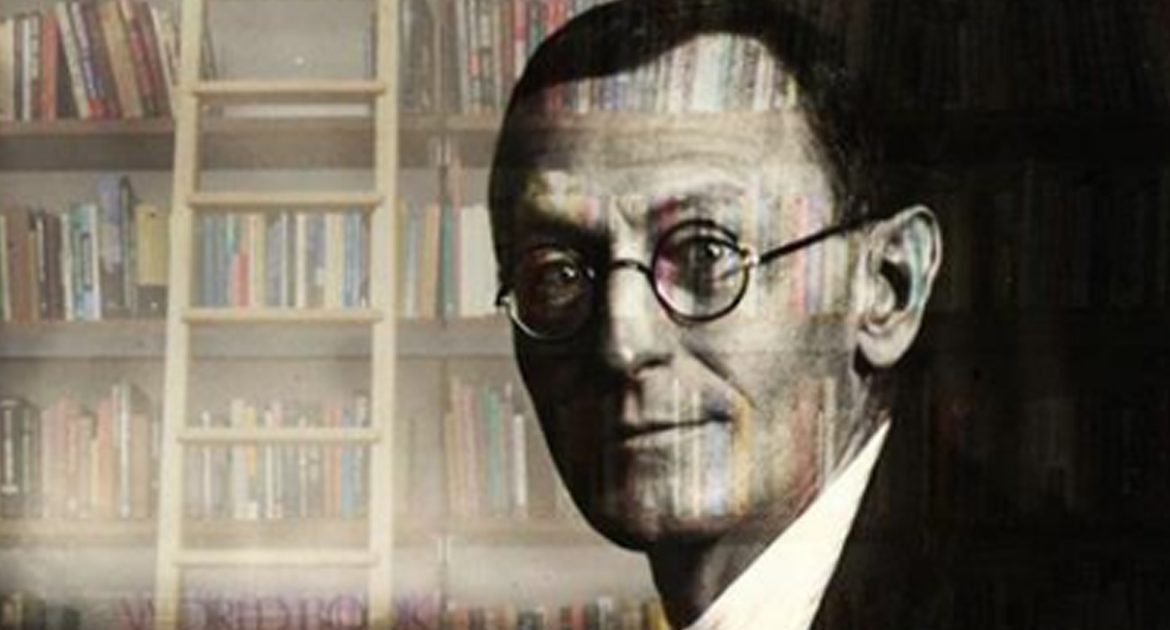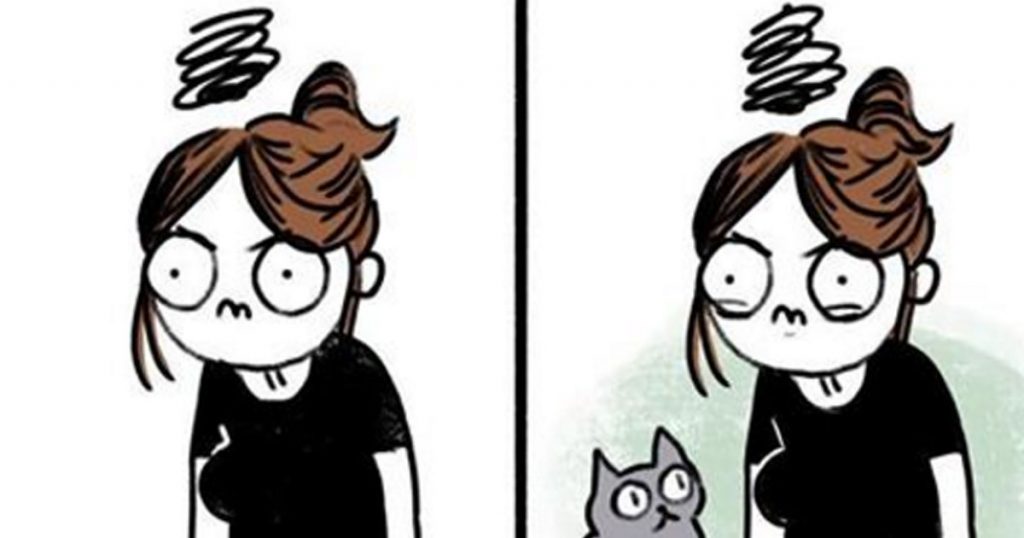“If anyone wants to try to enclose in a small space, in a single house or a single room, the history of the human spirit and to make it his own, he can only do this in the form of a collection of books.”
BY MARIA POPOVA
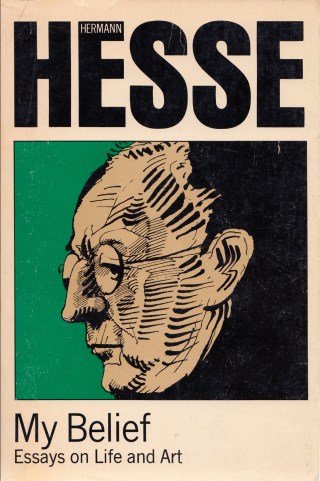
The Magic of the Book: Hermann Hesse on Why We Read and Always Will
I recently decided to teach myself to write with my left hand. This unorthodox pastime was sparked in part by rereading the vintage treasure Essays for the Left Hand by the pioneering Harvard psychologist Jerome Bruner, one of the loveliest and most underappreciated books written in the twentieth century. Since it was National Poetry Month, every day for the month of April I wrote out a poem a day with my left hand.
Beyond the tangible satisfaction of mastery painstakingly acquired, the endeavor had one unexpected and rather magical effect — it opened some strange and wonderful conduit through space and time, connecting me to the version of myself who was first learning to read and write as a child in Bulgaria. Generally lacking early childhood memories, I was suddenly electrified by a vividness of being, a vibrantly alive memory of the child’s pride and joy felt in those formative feats of the written word, of wresting boundless universes of meaning from pages filled with lines of squiggly characters.
Somehow, as we grow up and learn to read, the thrill of mastery hardens into habit and we let the magical slip into the mundane. We come to take this wondrous ability for granted.
No one has restored the transcendence of the written word more beautifully than Nobel-winning German-born Swiss writer and painter Hermann Hesse (July 2, 1877–August 9, 1962) in a sublime 1930 essay titled “The Magic of the Book,” found in his posthumously published treasure trove My Belief: Essays on Life and Art (public library).
Hesse writes:
Among the many worlds that man did not receive as a gift from nature but created out of his own mind, the world of books is the greatest… Without the word, without the writing of books, there is no history, there is no concept of humanity. And if anyone wants to try to enclose in a small space, in a single house or a single room, the history of the human spirit and to make it his own, he can only do this in the form of a collection of books.
The question of what books do and what they are for is, of course, and abiding one. For Kafka, books were “the axe for the frozen sea within us”; for Carl Sagan, “proof that humans are capable of working magic”; for James Baldwin, a way to change our destiny; for Neil Gaiman, the vehicle for the deepest human truths; for Polish Nobel laureate Wisława Szymborska, our ultimate frontier of freedom. Falling closest to Galileo, who saw reading as a way of having superhuman powers, Hesse considers the historical role of the written word:
With all peoples the word and writing are holy and magical; naming and writing were originally magical operations, magical conquests of nature through the spirit, and everywhere the gift of writing was thought to be of divine origin. With most peoples, writing and reading were secret and holy arts reserved for the priesthood alone.
[…]
Today all this is apparently completely changed. Today, so it seems, the world of writing and of the intellect is open to everyone… Today, so it seems, being able to read and write is little more than being able to breathe… Writing and the book have apparently been divested of every special dignity, every enchantment, every magic… From a liberal, democratic point of view, this is progress and is accepted as a matter of course; from other points of view, however, it is a devaluation and vulgarization of the spirit.
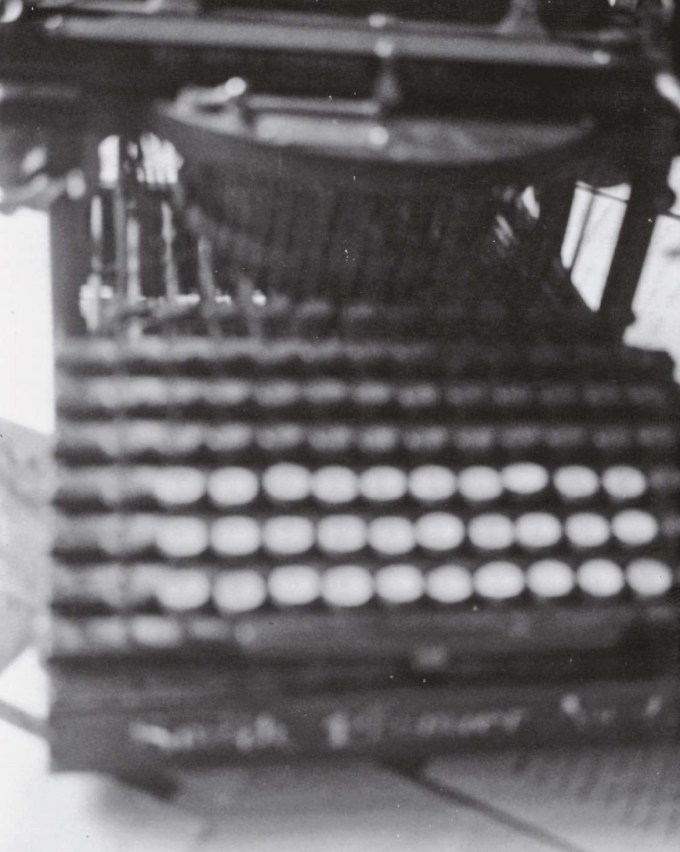
Hermann Hesse’s typewriter (Photograph by Patti Smith from M Train)
And yet Hesse offers an optimistic counterpoint to the techno-dystopian narratives that have continued to spell out the death of the book in the almost-century since his essay. Writing just a few years after Virginia Woolf’s spirited admonition against the evils of cinema, Hesse argues that new media forms — radio and film then, the internet now — pose no threat to the book, for the book is singular in its spiritual value to human life:
We need not fear a future elimination of the book. On the contrary, the more that certain needs for entertainment and education are satisfied through other inventions, the more the book will win back in dignity and authority. For even the most childish intoxication with progress will soon be forced to recognize that writing and books have a function that is eternal. It will become evident that formulation in words and the handing on of these formulations through writing are not only important aids but actually the only means by which humanity can have a history and a continuing consciousness of itself.
In a remarkably prescient passage, he adds:
We have not quite reached the point where younger rivals like radio, film, and so forth have taken everything away from the printed book, but only that part of its function which is dispensable.
[…]
What the crowd does not yet suspect and will perhaps not discover for a long time has already begun to be decided among creators themselves: the fundamental distinction between the media through which an artistic goal is attempted. When this divorce is final, to be sure, there will still be sloppy novels and trashy films, whose creators are unstable talents, freebooters in areas in which they lack competence. But to the clarification of concepts and the relief of literature and her present rivals this separation will contribute much. Then the cinema will be no more able to damage literature than, for example, photography has hurt painting.
What lends the book this unshakable stability, Hesse argues, is precisely its magical character — a character immutable and irreplaceable however much our media might change. He writes:
The laws of the spirit change just as little as those of nature and it is equally impossible to “discard” them. Priesthoods and astrologers’ guilds can be dissolved or deprived of their privileges. Discoveries or poetic inventions that formerly were secret possessions of the few can be made accessible to the many, who can even be forced to learn about these treasures. But all this goes on at the most superficial level and in reality nothing in the world of the spirit has changed since Luther translated the Bible and Gutenberg invented the printing press. The whole magic is still there, and the spirit is still the secret of a small hierarchically organized band of privileged persons, only now the band has become anonymous.
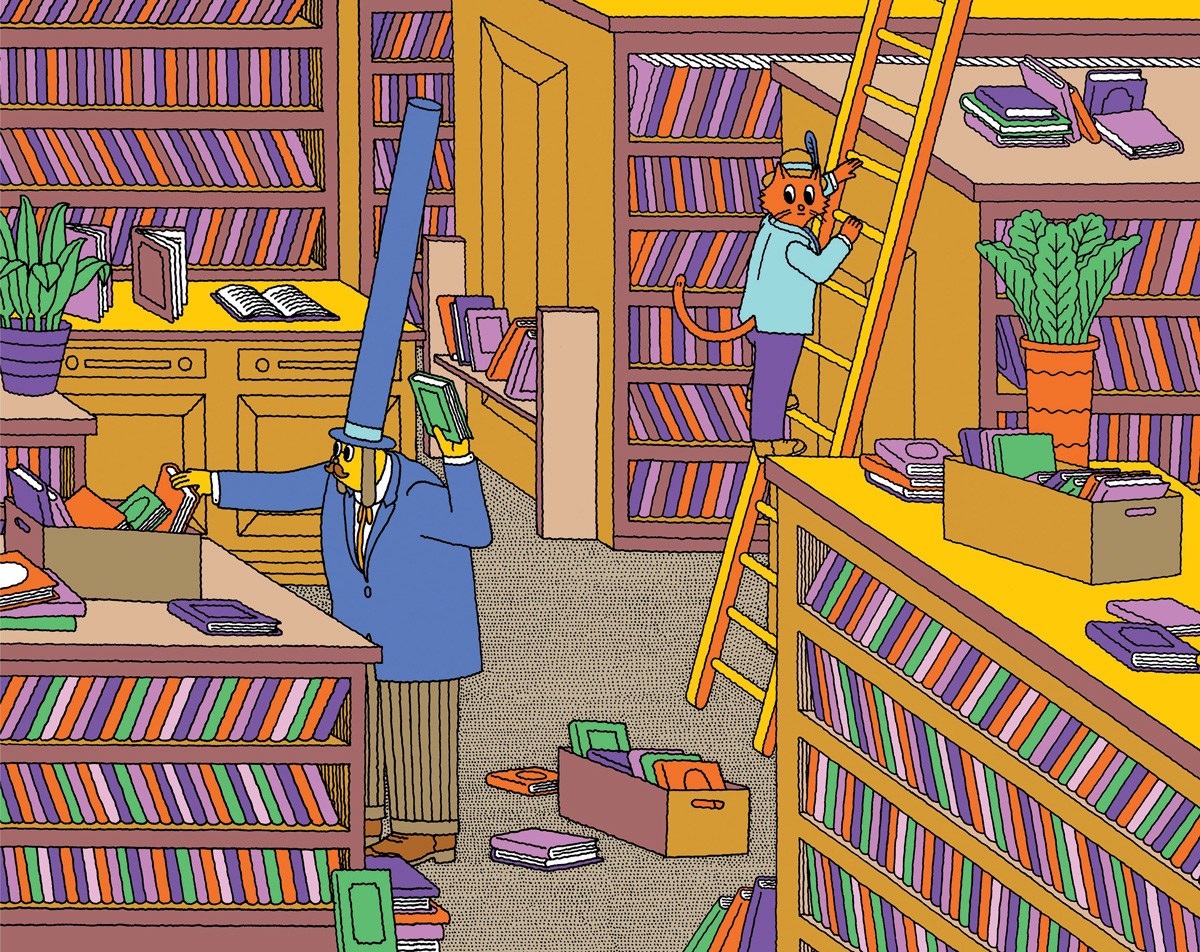
Illustration from Mr. Tweed’s Good Deeds by Jim Stoten
In a tremendously poignant sentiment that illustrates today’s culture-making, culture-breaking difference between artists and writers, on the one hand, and “content-creators” on the other — that is, presaging our vacant contentification of cultural material — Hesse adds:
Leadership has slipped out from the hands of priests and scholars to some place where it can no longer be called to account and made responsible, where, however, it can no longer legitimatize itself or appeal to any authority. For that stratum of writers and intellectuals which seems from time to time to lead because it shapes public opinion or at least supplies the slogans of the day — that stratum is not identical with the creative stratum.
That creative stratum, he argues, consists of timeless works that continue to enchant the public imagination decades or centuries or millennia after their creation, be they the ancient Eastern philosophies newly embraced by the West or the works of Nietzsche, “unanimously rejected by his people, after fulfilling his mission for a few dozen minds, became several decades too late a favorite author whose books could not be printed fast enough.” Hesse uses the word “poet” in that largest James Baldwian sense and in the very act of reaching us from beyond the finitude of his own lifetime, he stands as a testament to his own point:
We can observe every day how completely marvelous and like fairy tales are the histories of books, how at one moment they have the greatest enchantment and then again the gift of becoming invisible. Poets live and die, known by few or none, and we see their work after their death, often decades after their death, suddenly rise resplendent from the grave as though time did not exist.
And what they give us upon rising is precisely that magic of the book, so perennial and inextinguishable, yet so easily forgotten and taken for granted:
If today the ability to read is everyone’s portion, still only a few notice what a powerful talisman has thus been put into their hands. The child proud of his youthful knowledge of the alphabet first achieves for himself the reading of a verse or a saying, then the reading of a first little story, a fairy tale, and while those who have not been called seem to apply their reading ability to news reports or to the business sections of their newspapers, there are a few who remain constantly bewitched by the strange miracle of letters and words (which once, to be sure, were an enchantment and magic formula to everyone). From these few come the readers. They discover as children the few poems and stories … and instead of turning their backs on these things after acquiring the ability to read they press forward into the realm of books and discover step by step how vast, how various and blessed this world is! At first they took this world for a little child’s pretty garden with a tulip bed and a little fish pond; now the garden becomes a park, it becomes a landscape, a section of the earth, the world, it becomes Paradise and the Ivory Coast, it entices with constantly new enchantments, blooms in ever-new colors. And what yesterday appeared to be a garden or a park or a jungle, today or tomorrow is recognized as a temple, a temple with a thousand halls and courtyards in which the spirit of all nations and times is present, constantly waiting for reawakening, ever ready to recognize the many-voiced multiplicity of its phenomena as a unity. And for every true reader this endless world of books looks different, everyone seeks and recognizes himself in it… A thousand ways lead through the jungle to a thousand goals, and no goal is the final one; with each step new expanses open.
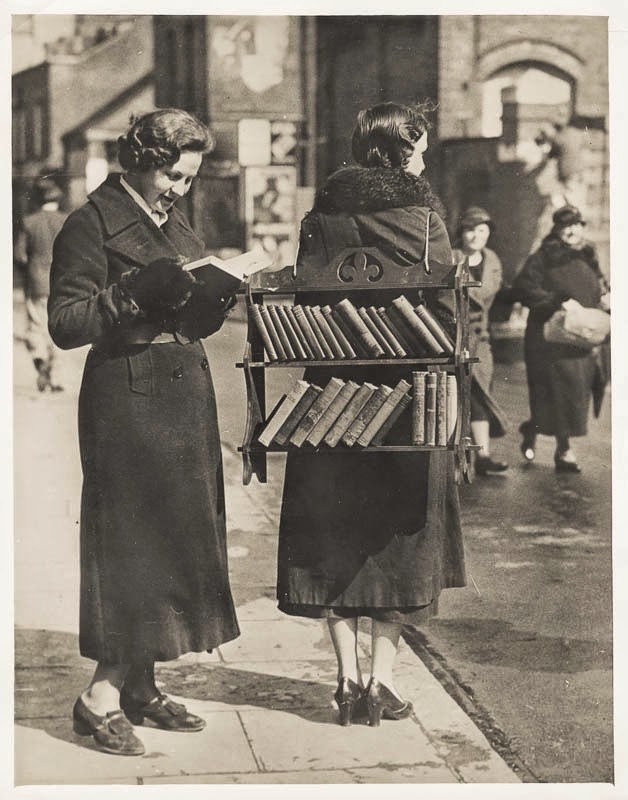
Walking library, London, 1930s (VSW Soibelman Syndicate News Agency Archive)
Half a century before Bob Dylan asserted that “the world don’t need any more songs [because] there’s enough songs for people to listen to, if they want to listen to songs,” Hesse makes the same point — a point with which, as any regular reader would know, I very much agree — about books:
Every true reader could, even if not one new book were published, spend decades and centuries studying on, fighting on, continuing to rejoice in the treasure of those already at hand.
What lends reading its ultimate magic, Hesse asserts, is that this vast body of the written word is at once immensely varied and reducible to the simplest, most universal human truths:
The great and mysterious thing about this reading experience is this: the more discriminatingly, the more sensitively, and the more associatively we learn to read, the more clearly we see every thought and every poem in its uniqueness, its individuality, in its precise limitations and see that all beauty, all charm depend on this individuality and uniqueness — at the same time we come to realize ever more clearly how all these hundred thousand voices of nations strive toward the same goals, call upon the same gods by different names, dream the same wishes, suffer the same sorrows. Out of the thousandfold fabric of countless languages and books of several thousand years, in ecstatic instants there stares at the reader a marvelously noble and transcendent chimera: the countenance of humanity, charmed into unity from a thousand contradictory features.
My Belief remains a boundless treasure of Hesse’s genius, aglow with his luminous wisdom on everything from art to happiness to old age to the legacies of creative titans like Goethe, Dostoyevsky, Walt Whitman, Hans Christian Andersen, D.H. Lawrence, and Carl Jung. Complement it with Hesse’s beautiful correspondence with Thomas Mann, E.B. White on the future of reading, and Neil Gaiman on why we read and tell stories.
